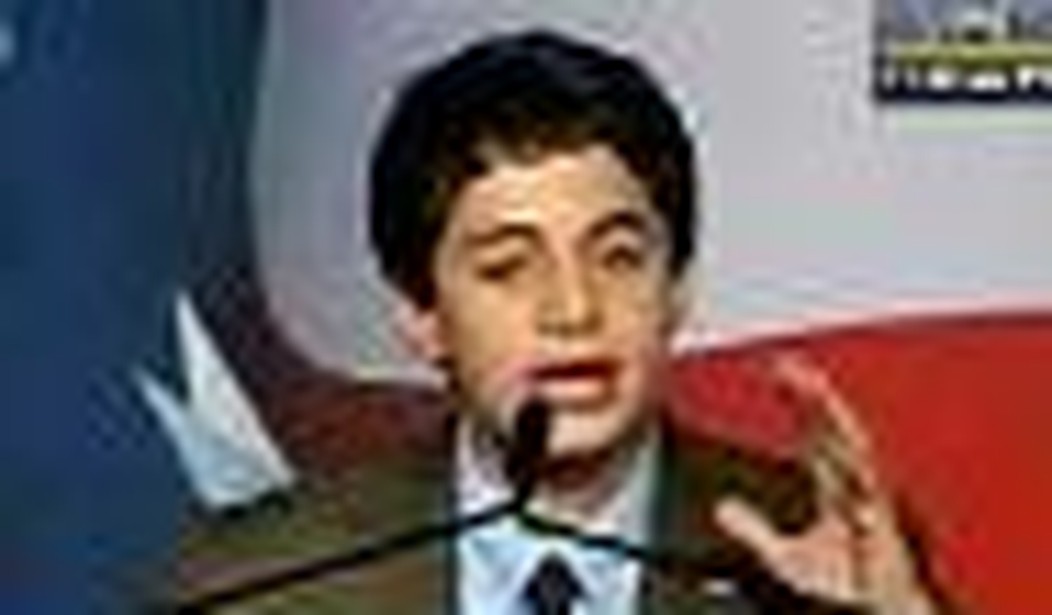He was a finalist for Time’s 100 most influential people. He’s got a radio show in the works and has a book on its way to the stores. This past Friday, he made the trip to Chattanooga to headline the Lincoln Day Dinner with four candidates for governor.
Oh, by the way, he’s fourteen.
Jonathan Krohn is not the first teenage political pundit, but the level of notoriety he’s achieved in a few months is stunning. Krohn lacks polish, but he makes up for that with competence in understanding political issues and unflappable confidence.
Some liberals have made fun of Krohn, while others have tipped their hat to him — as did most Huffington Post commenters. Many conservative bloggers have embraced Krohn, primarily because the fourteen-year old is better able to defend conservative values than many members of Congress.
But Krohn’s harshest critics come from the right. They believe Krohn lacks the life experience to be commenting on politics. Hot Air’s Allah Pundit asks, “Does he understand what he’s saying, or is he just doing some sort of superb mynah-bird impression of a conservative pundit in the Tucker Carlson mold?”
Likewise, President Herbert Hoover once advised a young man not to concern himself with politics until he turned twenty-one. And there’s the famous quote by Winston Churchill that a young conservative has no heart but an old liberal has no brain.
Is Krohn a brainwashed puppet of dastardly right-wing parents, or a shining light for conservatism’s way forward?
The idea Krohn represents parental brainwashing is condescending, particularly given that Krohn has explained neither of his parents are particularly political. Believe me, it can happen. I got interested in politics at about Krohn’s age. My parents were not into politics. My father hadn’t voted in five consecutive presidential elections, and his vote in 1968 was for perennial candidate Pat Paulsen.
I formed my opinions by doing a lot of reading, writing, listening, and studying. By fourteen, I knew enough about politics to bore most adults. Of course, I didn’t have a national platform.
Other teenagers have gotten their shot and heretofore the results have not been pleasant.
Kyle Williams is perhaps the most obvious example. He began writing for WorldNetDaily.com in 2001 at age 12 and also had a book published. He got in a speech at the National Press Club and a few TV interviews before he mostly disappeared, except for his weekly article for WND every Saturday.
I read Williams’ column with interest, but it began to take a turn towards the end. My wife remarked, “Someone that young shouldn’t be this cynical.” Williams went from conservative cheerleading to dishing on conservatives and their causes. Williams was struggling with who he was, what he believed, and what he wanted to do with his life in front of an audience of thousands. Williams ended his column in 2005 at the age of sixteen.
Another teenager, Hans Zieger, began a column at age seventeen and ended up writing for WorldNetDaily.com as well. He had a unique focus on issues relating to the liberal assault on the Boy Scouts and wrote a book on the topic, as well as another one called Reagan’s Children. He “retired” at twenty-one at the end of 2006, declaring, “I don’t know enough to be weekly offering my opinions as though possessed of some eminence.” Zieger is now a senior fellow at the American Civil Rights Union, a conservative alternative to the ACLU.
Krohn has several advantages over Williams and Zieger that could produce better results.
First, he exudes a self-confidence that is a rare quality at his age and a must for survival in the world of punditry. He’s not intimidated by any venue or at all starstruck. He doesn’t strike me as the type to write several hundred columns and then declare, “What the heck do I know?”
Second, Krohn has a clear friend and mentor in William Bennett. I think it’s undeniable that some adult guidance and advice can help as you’re entering a field and what Bennett has provided is invaluable. My early political involvement was encouraged and strengthened by the Montana state legislators, who invested time in me. Bennett’s even greater investment will have an even greater effect on Krohn.
Third, Krohn’s timing is better. Williams and Zieger began their columns in the middle of the Bush administration. In the age of Obama, with a conservative movement that is wary of its own party establishment and thoroughly disgusted with the betrayals of conservative principles, a great many opportunities exist for new voices that didn’t exist in the Bush era. Krohn’s case is also helped by his focus on first principles that seem to have been forgotten by political forecasting pundits.
Of course, these differences don’t answer the challenges of critics. How could Krohn be qualified to opine on the issues of the day? And what of the loss of childhood that’s occurring here?
The entire question of age is an ad hominem that avoids addressing his actual statements on the issues. It’s true a teen political writer has not directly experienced much of what he writes about. However, it’s also true that adult columnists write frequently about policy issues that they’ve only read about in books and magazines. They have to, because there’s a limit to human experience and we can’t experience everything directly.
Second, being a pundit depends on an ability to engage your audience. Every successful columnist and radio host does that. If Krohn does that, he meets the job requirements quite nicely.
Writing quality does improve with age. I sent in letters to the editor and posted a few articles on my personal site in my teenage years. I don’t regret anything I said in those pieces, but if writing them today, I would have said them much better.
However, had I stayed out of politics until twenty-one like President Hoover suggested, while my mechanics might have been stronger to start, my writing would now be far shallower. It’s true that I can talk about my wife and my mortgage while Krohn cannot, but there is no teacher in the world of politics like experience.
I’ve been heavily involved in politics from ages that Krohn’s critics would consider dangerous and unhealthy. The result? I remember things that most people my age have to rely on a book for because they weren’t paying attention at the time. I’ve worked on a presidential campaign, congressional campaigns, and even a campaign for sheriff. I’ve served on Republican central committees in two states and ran for two offices. I may only be twenty-eight, but I have the political resume of a forty-year-old.
Krohn is also running smack dab into “the soft bigotry of low expectations.” It’s been culturally ingrained that we ought to expect teenagers to be irresponsible slackers. But the history books tell how, when Andrew Jackson was thirteen, he became a courier for the Continental Army and endured the hardships of being a POW. John Quincy Adams, at age fourteen, was a secretary to the U.S Mission at St. Petersburg, Russia. Many teens will rise above our low expectations if only they’re given a chance.
The best way to look at Jonathan Krohn is the same way one looks at a baseball prospect. If Krohn gets a nationally syndicated radio show, it will most likely be a weekend show on maybe a dozen stations. That’s comparable to being assigned to play in the AA minor leagues. And just like a minor leaguer, Krohn’s future will depend on how well he proves himself at articulating conservative principles.
And like a baseball team, the conservative movement will go nowhere if they do not develop good talent through the minor leagues. No good baseball fan hopes for his team’s farm club to fail, and no good conservative should hope for a young man like Jonathan Krohn to fail.









Join the conversation as a VIP Member